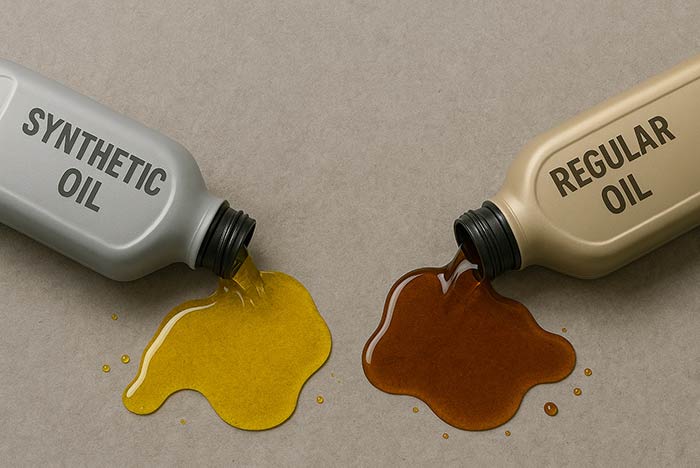
Synthetic Oil vs. Regular Oil – What’s the Difference & Should You Switch?
Engine oil isn’t just a fluid—it’s your engine’s lifeline. It reduces friction, keeps things cool, and prevents sludge from building up. But when you’re standing in front of shelves stacked with bottles labeled synthetic, conventional, or semi-synthetic, it’s easy to feel lost.
The big question most drivers ask is: what is the difference between synthetic oil and regular oil? And more importantly—is synthetic oil better than regular oil for your car?
With modern engines running hotter and lasting longer, oil quality matters more than ever. This guide breaks down how synthetic and regular oil are made, how they perform under real driving conditions, and whether the extra cost of synthetic oil is worth it in the long run.
We’ll also answer common questions like does synthetic oil last longer, can you switch between oil types, and is semi-synthetic oil a smart middle ground.
What Is the Difference Between Synthetic Oil and Regular Oil?
The main difference comes down to how each oil is made and how it performs.
Base Oil Type
🛢️ Regular oil (also called conventional oil) is refined from crude petroleum. It’s processed but still contains impurities and molecules of varying sizes.
🧪 Synthetic oil is engineered in a lab. It starts with a refined base oil, but it’s chemically altered to produce uniform, pure molecules tailored for performance.
Purity and Consistency
- Conventional oil contains natural contaminants like wax and sulfur. These can lead to sludge over time.
- Synthetic oil is free from these impurities. Its uniform structure allows smoother flow, better film strength, and cleaner operation.
Temperature Performance
- Regular oil thickens in cold weather and can thin out too much when hot. It struggles with extreme conditions.
- Synthetic oil flows well even in freezing temperatures and holds up under high heat. This keeps engine parts protected during cold starts and long drives.
Additive Packages
- All oils include additives, but synthetics typically come with more advanced packages.
- These additives help prevent oxidation, fight wear, and clean engine components.
Breakdown Resistance
- Conventional oil breaks down faster under stress, especially in turbocharged engines or during stop-and-go traffic.
- Synthetic oil resists thermal breakdown, which means it stays effective longer and keeps your engine protected.
TIP:
synthetic oil is more refined, more stable, and more protective—especially in demanding conditions. That’s the core difference, and it’s why many modern vehicles recommend or require it.
Is Synthetic Oil Better Than Regular Oil?
Yes—synthetic oil is better than regular oil in nearly every way that matters to your engine.
1. Better Engine Protection
Synthetic oil forms a stronger, more stable film on moving parts. That means less metal-to-metal contact, especially during cold starts or high RPMs. It also reduces wear in engines with tight tolerances, like turbocharged or performance models.
2. Performs Under Stress
Heat breaks down regular oil faster. In hot climates, towing, or traffic, conventional oil can thin out and lose its protective properties. Synthetic oil handles high temps with ease and doesn’t degrade as fast.
3. Flows Faster When Cold
On cold mornings, regular oil thickens and takes time to circulate. That delay means your engine runs dry for a few seconds. Synthetic oil flows right away—even below freezing—reducing startup wear.
4. Keeps Engines Cleaner
Synthetic oil burns cleaner and includes strong detergents. It helps prevent sludge, varnish, and deposits from forming. That means longer life and better efficiency.
5. Extends Engine Life
Engines running on synthetic oil typically last longer. Less friction, cleaner operation, and better heat control all add up to fewer problems over time.
When Synthetic May Not Be Necessary
If you drive an older, low-mileage car with no turbo, and you change oil on time, regular oil can still work fine. But if you want longer intervals, lower wear, and better fuel economy, synthetic wins.
Does Synthetic Oil Last Longer Than Regular Oil?
Yes—synthetic oil lasts significantly longer than regular oil. That’s one of its biggest advantages.
1. Longer Oil Change Intervals
- Conventional oil typically needs to be changed every 3,000 to 5,000 miles (about 4,800 to 8,000 kilometers).
- Full synthetic oil can often go 7,500 to 15,000 miles (about 12,000 to 24,000 kilometers) between oil changes, depending on the brand and your vehicle.
That means fewer oil changes per year and less hassle for you.
2. Resists Breakdown
Synthetic oil resists oxidation and thermal breakdown better. It doesn’t thicken up or form sludge as fast as conventional oil. Even in high heat or stop-and-go traffic, it holds its protective qualities longer.
3. Cleaner Over Time
Over long intervals, regular oil tends to build up deposits. Synthetic oil stays cleaner and helps keep the engine cleaner too. That reduces wear and improves performance over time.
4. Depends on Driving Style
Hard driving, short trips, towing, or extreme weather can shorten any oil’s lifespan. But even in tough conditions, synthetic oil usually outperforms regular oil.
Real-World Example
Some premium synthetic oils, like Mobil 1 Extended Performance, are rated for up to 20,000 miles (32,000 km) under ideal conditions. That’s over 4 times longer than some conventional oils.
Can You Switch from Synthetic Oil to Regular Oil (or Mix Them)?
Yes, you can switch between synthetic and regular oil, and even mix them if needed—but there are a few things to keep in mind.
1. Can You Switch from Synthetic to Regular Oil?
Yes. Modern engines can run on either type as long as the oil meets your vehicle’s specifications (look for the API rating or viscosity like 5W-30 in your owner’s manual). Switching won't harm the engine.
But if your engine requires synthetic oil—like many turbocharged or high-performance engines—don’t downgrade to conventional. It can lead to faster wear or overheating.
2. Can You Use Regular Oil After Synthetic?
Yes, but you’ll lose the benefits that synthetic oil offers—like better protection, cleaner operation, and longer intervals. Also, if your car has been using synthetic for years, switching to regular oil in an older engine might increase sludge risk, especially if it’s not maintained well.
3. Can You Mix Synthetic and Regular Oil?
Technically, yes. Most synthetic and conventional oils use similar base stocks and additives, so mixing them won’t cause chemical damage. For example, if you’re topping up low oil and only have conventional on hand, it’s safe to mix.
However, mixing the two will reduce the performance of the synthetic oil. Don’t rely on mixed oil for extended intervals—change it sooner.
4. When Switching Is Not Recommended
Avoid switching back and forth frequently if:
- Your engine is already high-mileage and running well on synthetic.
- Your car manufacturer specifically recommends or requires synthetic (check the owner’s manual).
- Your engine is prone to sludge or has known oil-related issues.
Is Semi-Synthetic Oil Worth It?
Yes, semi-synthetic oil can be worth it—especially if you’re looking for a budget-friendly middle ground between regular and full synthetic.
1. What Is Semi-Synthetic Oil?
Also called synthetic blend, semi-synthetic oil is a mix of:
🛢️ Conventional oil (base petroleum)
🧪 Synthetic oil (engineered base with additives)
It’s designed to offer better protection than regular oil at a lower price than full synthetic.
2. Performance Boost Over Regular Oil
Semi-synthetic oil handles higher temperatures and engine stress better than conventional oil. It provides:
🛡️ Better wear protection
🔥 Improved resistance to oxidation
⚙️ More stability under load
It’s a good option for:
🚗 Older cars that aren’t too worn
🚙 Daily drivers with moderate use
🛻 Light-duty trucks or SUVs
3. Not as Durable as Full Synthetic
While it’s an upgrade from conventional, it’s not as clean or long-lasting as full synthetic. You’ll likely need to change it every 5,000 to 7,500 miles (8,000 to 12,000 km), depending on your engine and driving habits.
4. Lower Cost
It’s typically 20–30% cheaper than full synthetic and only slightly more expensive than regular oil. If you're on a budget but still want some of the benefits of synthetic, it’s a smart compromise.
5. Worth It for Many Drivers
For average drivers who:
- Don’t tow
- Don’t have high-performance engines
- Want better protection than regular oil
How Many Miles Can You Go on Full Synthetic Oil?
You can usually go 7,500 to 15,000 miles (about 12,000 to 24,000 kilometers) on full synthetic oil, depending on several key factors.
1. Manufacturer Guidelines
Most modern cars that use full synthetic oil have factory-recommended intervals between:
- 7,500 and 10,000 miles (12,000–16,000 km)
- Some vehicles—especially luxury or performance brands—allow up to 15,000 miles (24,000 km) between changes
Always follow your owner's manual. Some engines may need more frequent changes based on how they’re tuned.
2. Driving Conditions Matter
Even with synthetic oil, how you drive affects oil life:
- City driving, short trips, or stop-and-go traffic wear oil down faster
- Towing, high speeds, or extreme heat put more stress on the oil
- In those cases, stick to the shorter end of the interval (closer to 7,500 miles or 12,000 km)
3. Oil Brand Quality
Premium full synthetics (like Mobil 1, Pennzoil Ultra Platinum, Castrol EDGE) often contain:
- Stronger detergents
- Better viscosity control
- Additives that prevent oxidation and sludge
These oils can last longer—some even claim up to 20,000 miles under ideal conditions. Still, it’s smart to change the oil filter midway or check oil condition if you’re pushing limits.
4. Oil Monitoring Systems
Many newer cars have an oil life monitoring system. This system uses data like RPMs, temperature, and trip length—not just mileage—to tell you when to change the oil. Trust it if your car has it.
5. Signs You’ve Gone Too Far
Watch out for:
🔊 Engine ticking or knocking sounds
🛢️ Dark, dirty, or gritty oil
⛽ Drop in fuel economy
🚨 Check engine or oil change light
FAQ – Common Questions About Synthetic vs Regular Oil
Can synthetic oil cause leaks in older engines?
Not directly. Synthetic oil has smaller, more uniform molecules that can seep through worn seals more easily than conventional oil. If an older engine already has leaks or dried-out gaskets, switching to synthetic might make them more noticeable. It doesn't cause the leak—it just reveals what’s already there.
Is it okay to switch back and forth between oil types?
Yes. You can go from regular to synthetic or vice versa without damaging the engine, as long as the oil type and viscosity meet manufacturer specs. But frequent switching isn’t recommended—it’s best to pick one and stick with it for consistency and performance.
Can I mix synthetic and regular oil?
Yes, mixing is safe in emergencies, but it's not ideal. Doing so dilutes the benefits of synthetic oil—like better temperature stability and cleaner operation. If you mix them, treat it like regular oil and change it sooner.
How do I know if my car needs synthetic oil?
Check your owner’s manual. Some newer cars—especially turbocharged, high-performance, or luxury models—require full synthetic to meet heat and wear demands. If synthetic is “recommended,” it’s optional but offers longer engine life and better performance.
Is synthetic oil worth it for short trips or city driving?
Yes. Short trips are hard on engines, especially during cold starts. Synthetic oil flows faster and protects better right from the first second. It also resists sludge buildup, which is common in cars that don’t warm up fully during short drives.
Does synthetic oil improve fuel economy?
A little. Synthetic oil reduces internal friction more than regular oil, which can improve fuel economy by 1–2% on average. It's not a huge jump, but over time, it adds up—especially for high-mileage drivers.
Will synthetic oil void my warranty?
No—as long as it meets the required specifications for your car (check the label for API certification and viscosity). In fact, some automakers recommend or require synthetic to keep the warranty valid.
How often should I check synthetic oil between changes?
At least once a month. Even though synthetic lasts longer, oil levels can still drop from leaks, burning, or normal use. Catching low oil early can prevent major engine damage.
If you need, I can turn these into a collapsible FAQ section for a blog page. Would that help?

